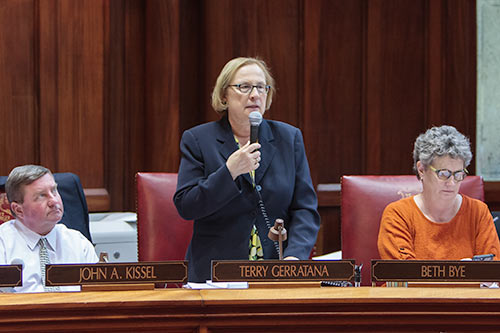Gerratana Leads Unanimous Senate Passage of Legislation to Combat the Opioid Epidemic
Bill limits access to opioids, expands access to overdose reversal medications, and takes other steps to fight opioid addiction

Senator Terry Gerratana (D-New Britain) today led the overwhelming, bipartisan passage of House Bill 7052, which takes several critical steps toward further combatting the opioid epidemic in Connecticut.
An increase in prescriptions for opioid painkillers by doctors has led to a dramatic increase in people addicted to heroin and other opioids. The CDC reported that people who use prescription opioid painkillers are 40 times more likely to try heroin. Every year there is a significant increase in heroin deaths. There were 917 fatal overdoses in Connecticut during 2016, an increase of 26 percent over the previous year, and the vast majority of these involved opioids.
“The opioid epidemic has touched every community in Connecticut, tragically capturing loved ones in addiction and taking hundreds of lives,” said Senator Gerratana. “We have all heard the tragic stories of people prescribed opioids by their doctor following an injury or medical procedure, only to find themselves descending into a tailspin of addiction. We need to slow the spread of these dangerous drugs and help pull people back from their addiction and help them get the care they need. This bill will save lives. It will further limit the overuse and abuse of prescription opioids and expand access to life-saving care. I applaud all of my colleagues who helped work on this bill. We will continue to do our part to support the families and medical professionals who are doing the important work of putting people on the road to recovery from opioid addiction.”
We have all heard the tragic stories of people prescribed opioids by their doctor following an injury or medical procedure, only to find themselves descending into a tailspin of addiction. We need to slow the spread of these dangerous drugs and help pull people back from their addiction and help them get the care they need. This bill will save lives. It will further limit the overuse and abuse of prescription opioids and expand access to life-saving care. I applaud all of my colleagues who helped work on this bill. We will continue to do our part to support the families and medical professionals who are doing the important work of putting people on the road to recovery from opioid addiction.”
– Senator Terry Gerratana
http://senatedems.ct.gov/gerratana-news/740-gerratana-170606Posted by CT Senate Democrats on Tuesday, June 6, 2017
This year’s bill builds upon bills passed by Senator Gerratana in previous years to fight back against the growing opioid epidemic. This year’s bill:
- Establishes a “standing order” model, which would make it easier for friends and family members of opioid addicts to obtain Narcan, the life-saving opioid overdose reversal medication;
- Reduces the maximum opioid prescription for minors from 7 days to 5 days, unless the prescribing doctor can document that an extended prescription is absolutely necessary to treat chronic pain, acute pain, or palliative care;
- Requires that health insurers cover medically necessary detox equipment
- Allows for the safe disposal of unused medications by registered nurses (RNs) providing home health care, which can include taking the medications to a prescription drug drop box;
- Increases the sharing of data on opioid abuse and opioid overdose deaths by state agencies;
- Makes opioid prescriptions more secure by ensuring that they be electronically prescribed, rather than prescribed using a pad and paper;
- Requires alcohol and drug treatment facilities use American Society of Addiction Medicine (ASAM) criteria for admission guidelines
- Ensures that all patients being prescribed an opioid are informed and aware of the risks of opioid use, signs of addictions, and dangers of drug interactions; and
- Allows patients to add a file to their medical record indicating that they do not want to be prescribed or administered any opioids.
Now that House Bill 7052 has passed in the Senate and House of Representatives, it moves to the desk of Governor Dannel P. Malloy and awaits his signature.
Share this page: